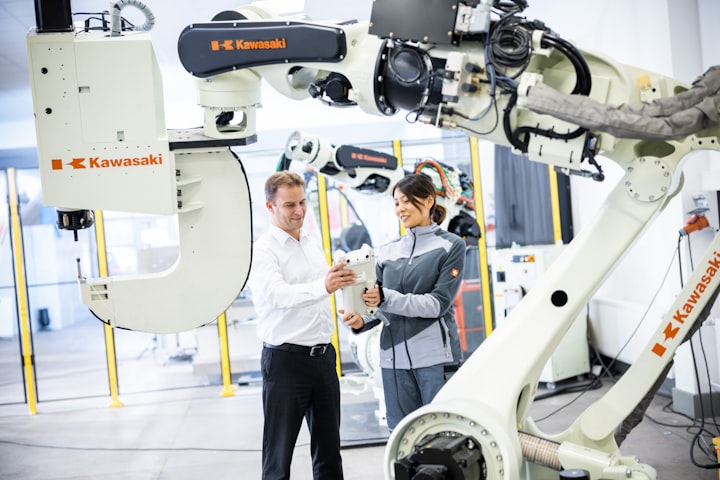Top 12 Benefits Of Robotic Process Automation For Your Business
Benefits Of Robotic Process Automation

In the Enterprise Age, it is not enough to automate your business processes; you must also automate your people to help them be more productive, innovative, and agile. Business Process Automation (BPA) is the branch of application automation that helps companies run their business in an automated way by automating and streamlining their existing business processes. It can help organizations: reduce errors, be more efficient, and deliver a better customer experience.
The enterprise needs to be agile and nimble and think in terms of continuous improvements to service its customers. This requires using multiple automation technologies, each of which has its own strengths and weaknesses. It also requires orchestrating across and combining numerous automation technologies into one orchestrator.
Simply put, it's all about speed. Customers want to immediately watch, hear and interact with their products and services. They don't want to get stuck in a lengthy sales cycle. They want to find solutions.
The past few years have seen an explosion in the number of organizations adopting robotic process automation (RPA). This is especially true in enterprise technology, where RPA has already found a home in many high-profile organizations across all industries, such as Amazon, Home Depot, and Marriott. As organizations look to increase their RPA adoption, they are focusing on how to automate processes and enhance operational efficiencies. This is especially true in customer service, where RPA has become a key component of achieving a more personalized customer experience.
Are you ready to get on a voyage to explore the wonders offered by RPA?
Stay hooked to this space and keep scrolling…
What is Robotic Process Automation?
RPA (Robotic Process Automation) is one of the most significant automation technologies that play a vital role in the overall solutions. RPA, with its very flexible and straightforward graphical user interface, has proven its value in virtually every industry. It is also one of the fastest-growing areas of technology.
It is a technology that can automate many office-level and back-office tasks to free up human resources (HR) to focus on strategic tasks. It can replace many administrative and clerical jobs and fully automate tasks performed by non-HR staff.
How does RPA help businesses?
The emergence of robot process automation as a means of process-automation automation has profoundly impacted how we conduct business across multiple industries. Some argue that robots will take our jobs and others foresee a future where automation makes them obsolete. In either case, the impact of robot process automation will require a skilled, trained workforce to operate and maintain the machines. This white paper explores how automation changes the workplace, arguing that robot process automation can transform industries, support businesses, and spur innovation while creating new opportunities.
We often hear that robots are not good at complex tasks. This is often true, but it is not always true! RPA can help solve many non-routine problems and can allow organizations to use existing technology more effectively. To help better understand the complexities of RPA, here are some examples of non-routine problems RPA has helped automate for organizations: creating legal documents; writing standards for clairvoyant agents; performing legal analysis; performing data entry; fact-checking and improving data accuracy; performing document review; performing data analysis to help determine the validity and accuracy of data;
RPA usage in different industries
RPA has expanded rapidly worldwide, particularly in emerging markets and developing countries. Today, fewer than 19% of large enterprises worldwide rely on RPA for 100% of their business processes. By 2023, RPA adoption is expected to have increased to roughly 80%.
Below you can take a look at significant industries being impacted positively by this RPA technology:
Banking- RPA is capable of performing tasks such as data entry, transcribing, converting content, and even performing simple calculations. Services that are typically performed by human beings can now be performed with AI-powered RPA or with a combination of RPA and human labor, in most cases reducing the need for human work.
It has proven itself to be a valuable tool for the banking industry, which reduces the need for human resources and also reduces the need for manual data entry while increasing the accuracy and efficiency of financial transactions by eliminating errors and reducing the automated human labor required for the entry of data. This means that RPA has the potential to make low- to mid-skill jobs easier and more accessible to people and to maximize efficiency and minimize costs.
Insurance- RPA helps insurance companies automate data collection, reporting, and analysis. By automating data gathering and processing cuts down on the time, money, and resources spent by insurance companies, helping to minimize costs and maximize efficiency.
Healthcare- RPA is transforming the delivery of healthcare services by helping to automate business processes, improve data quality, and increase operational efficiency. It is the most intelligent business process automation tool on the market and a force for making healthcare data smarter.
It expands the reach of AI to improve the lives of millions of people and transform the way healthcare is delivered, saving valuable time and money for healthcare organizations.
Manufacturing - The use of robots for manufacturing has been around since the early 2000s, but it has only recently become a widespread and crucial part of modern manufacturing processes. Over the last decade, several major industries have automated manufacturing processes, primarily in the automotive and computer sectors. Automating manufacturing processes has replaced many jobs, increased worker productivity, and decreased overall employment levels.
It has made manufacturing companies shift their production units to automated software bots. It has enabled them to achieve high consistency, uniformity, and productivity levels while improving operational efficiency and product quality. In addition, because of the increased automation, these production processes have become more flexible and responsive without compromising on quality or increasing costs.
Finance- Finance professionals agree that RPA will significantly influence the finance sector over the next decade. In particular, combining the data analytics and automation skillsets to create a completely automated finance department is a major opportunity for finance professionals interested in RPA.
For finance executives, RPA technology can automate various operational processes, from loan and mortgage origination to payments, leaving them more time to focus on their strategic goals.
Retail- The mission of retail partners is to serve customers well by providing them with the information and services they need to succeed at their jobs and lives. Retail partners enable RPA to serve its customers more effectively by connecting them with the right solution at the right time and with the proper business outcomes.
IT- RPA in Information Technology can support operations in the workplace. RPA is a platform that enables businesses to process their unstructured data (or semi-structured data) using AI techniques and apply the latest machine learning models to extract meaningful insights and information. This platform can help businesses of all sizes extract insights from their data and automate their back-end processes to focus on their core business.
Now, look at some of the most engaging benefits RPA brings to your business…
Cost-efficiency
Robots have been used for various manual tasks for decades. Now, for the first time, robots are being used to perform complex work like delivering your own package. As a result, service robots are increasingly being used for deliveries in cities all over the world. Some shoppers are even requesting the service robot to bring them their groceries.
While the robot can work 24/7 and take no vacation when compared to humans, who work 8/5 and have a pre-fixed number of annual leaves each year, the robot has a much narrower bandwidth when compared to a human worker. The robot can only work for so long before it needs to be recharged or repaired.
Automation is a technology that has the potential to increase efficiency, reduce cost, and improve quality. In fact, automation is already having a significant impact on businesses and can help to drive greater productivity, higher quality, higher reliability, and lower cost.
Accuracy & Quality
RPA creates a real-time, accurate, and complete view of the entire workflow for a given business or organization and enables collaboration and real-time engagement across the whole workflow.
It offers improved services to processes with a high probability of human error, thereby increasing accuracy.
RPA eliminates the risk of human error and reduces the need for expensive dedicated human resources. It provides a mechanism to execute in an automated manner complex, time-consuming, and error-prone manual tasks, such as approving loan applications, that could previously only be done manually. It also allows companies to react more quickly to changes in the business environment, which results in a competitive advantage for businesses.
Don't forget, robots are reliable and consistent and do not whine when expected to work tirelessly; and also reduce the cases of re-works and improve the output quality drastically.
Consistency
Robotics is a safe, non-invasive technology that doesn't interfere with the inherent systems and provides perfect consistency in performing activities across the board, each time and every time. It is remarkable to think how much our lives have changed and evolved in just over a century.
Enhanced Analytics
Often, data from many different sources, including survey data, are used to produce analytics – the data generated from a survey instrument are beneficial for this purpose. The data may include responses from sales, finance, or human resources personnel and responses from other employees such as customer service or call center representatives. It is also common to get data from surveys distributed to a large audience, such as mailing lists or surveys distributed via the Internet.
The rapid proliferation of RPA-driven bots has forced businesses to rethink how they perform their back office functions. Many companies are turning to RPA platforms to help automate back-office tasks and free up their employees' time.
Further, they can make efficient decisions, which often results in improved sales, profits, and customer service.
Better employee productivity
With RPAs, you don't have to bother with mundane administrative tasks or hand-deliver reports. It means that you will be freed up to add new value or solve new problems. And because you only pay for the time that your RPA is working, there are no complicated upfront costs. You only pay for its service once it has done its job, ensuring you'll get your money's worth.
The use of RPA technology offers many beneficial features to the business, such as time savings, efficiency gains, and better customer service.
Robotic navigation has proven to be a great boon to users, helping them access information quickly and efficiently on the web. Robots can now provide users with answers to far more questions than they could have ever imagined before.
Improved Security
Robotic process automation can (and often does) benefit from granular control, which allows it to act on more negligible levels. This granularity makes automation more adaptable and less brittle, making it easier to build and adapt. A robotic process automation system can also be more flexible because it can handle changes in the data, task lists, and user requirements that arise as the system are used.
RPA helps businesses automate and optimize the critical operational tasks of business processes such as order entry, taking orders, or fulfillment, starting with the simplest or the biggest. It helps businesses provide better customer service and faster service and improve customer interaction.
Boost Scalability
Robotic process automation is the process of replacing a human worker with a computer-controlled machine. Traditionally, robots have been limited to performing simple, repetitive tasks that are easy for them to learn. A robotic process automation system, such as SMAC, takes on a broader range of more independent tasks, such as car assembling.
Robotic process automation offers flexibility to adapt to what the moment demands, the type, and the number of tasks needed for any given objective. This approach is appealing because it offers a high degree of versatility, enabling robotic process automation to be a valuable part of almost any workflow.
Improved customer service
A customer-service department freed up to help more customers in a more focused way is a critical goal. By freeing them from the burden of endless paperwork, customer-service department personnel can spend more time on more important matters, such as helping customers solve problems, keeping them up to date on their accounts, and responding to their questions.
An RPA adopted company, where the routine, repetitive and dull tasks are handed over to the robots, so the employees can better concentrate on customer care
The use of RPA is also driving new ways of operating business processes. RPA can automate the fulfillment of business processes, freeing customer service associates to handle other tasks. Downtime has also been cut, allowing customers to receive service faster, and at a lower cost.
Better ROI
Robotic process automation shifts the labor paradigm, reducing the number of workers needed for complicated jobs and boosting the productivity of those who remain. With the RPA platform, operational excellence means never missing a deadline, having better customer service, and reducing costs.
RPA technology will produce better results for businesses. But companies should begin seeing rapid ROI when they switch on their robotic workforce, with operating costs generally dropping quickly.
It is a type of data automation technology that helps businesses accelerate the delivery of digital services and improve the customer experience. As a result, RPA can help enterprises to enhance customer support, reduce operational costs, and become more agile.
Better IT Support
The RPA market is increasing and is expected to continue growing during the forecast period due to its high cost-reduction potential and the potential for large-scale deployment.
It promises to accelerate service desk processes in terms of accuracy, productivity, and turnaround time. It also leverages the power of AI to make better operational decisions.
Further, it has the potential to be an invaluable asset in the service desk arena. In some cases, it also has the potential to reduce the number of support calls dramatically. This is especially true for small and medium-sized businesses in highly-regulated industries.
Also, it improves the operational quality of the service desk and monitors the network, enabling companies to handle short-term spikes without having to recruit extra staff or train them.
Non-disruptive
Streamlining daily operations, automating repetitive tasks, and transforming work processes are not new; these are the day-to-day operations of many consumers and businesses today.
In fact, bots make people feel like they are carrying out their duties quickly and efficiently and are actually saving labor. Instead of typing or clicking, they simply give their commands and allow the bot to carry them out.
Automation enables RPA to perform dull but necessary manual tasks, freeing humans to focus on tasks they find more engaging. RPA simplifies the manual data entry process, freeing humans to enter data quickly and move on to more innovative tasks.
Effortless Implementation
RPA is proliferating as the automation of simple tasks makes more complex jobs possible. However, it is essential to learn the limits and cautions of RPA and caution against over-automation. RPA remains a relatively new technology, and there are many unique challenges that its use poses, especially for those in a position to automate data entry tasks. The implementation of RPA does not always involve API calls or the use of APIs to receive or send data, so it is vital to understand the implications of RPA on the user experience and interpret them appropriately.
What does the future hold?
Technology-enabled automation is transforming the ways we work, shop, and play. It's changing the way we live and how we work together. It is also changing the way we teach, learn, exercise, and socialize. This presentation will explore how RPA technologies—such as Robotic Process Automation (RPA)—transform workplaces and improve processes through automation.
In the next few years, it is expected that RPA will replace a significant portion of the document-based clerical work in many businesses. Thereby eliminating millions of hours of redundant typing and reducing the number of errors through increased accuracy. In the short run, RPA is expected to replace at least 50% of the clerical work currently being done by humans.
Conclusion
The RPA is creating a second parallel economy that connects to the physical economy in concurrent systems to speed up and optimize knowledge work. This parallel economy is built on a series of technologies that provide concurrent systems with increased capability and performance.
If you have yet to unleash the possibilities powered by RPA, it is time to come forth and explore further.
Technology is at a constant evolving pace whether it is Artificial Intelligence, Blockchain, AR/VR or xR, our world can relish tech advancement at its best.
Don’t wait and witness the revolutionary change in your business and hire mobile app developers. If you want to navigate through a step-by-step guide to implementing RPA in your business with positive outcomes, then keep watching this space for more excitement to knock on your door.
Until next time, Happy Reading!
About the Creator
Albert Smith
Albert Smith is a digital marketing manager with Hidden Brains, a leading enterprise web & mobile app development company specializing in mobile & web applications, IoT, cloud and big data services.






Comments
There are no comments for this story
Be the first to respond and start the conversation.